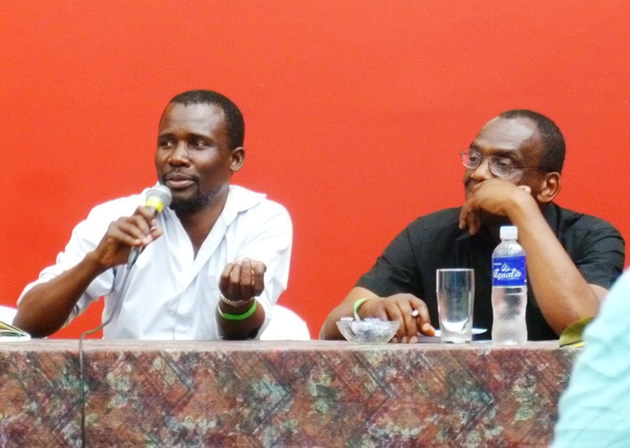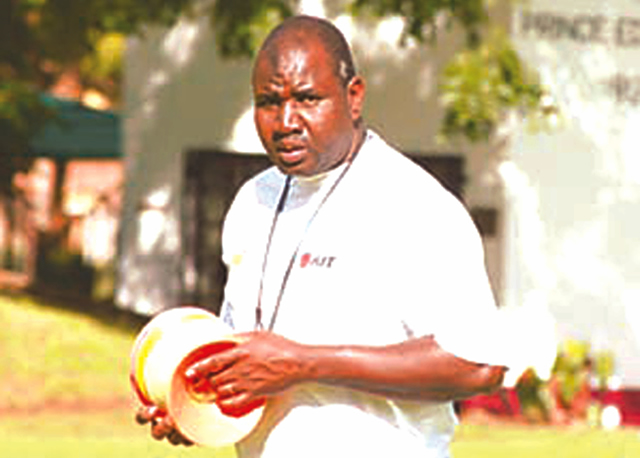A tale of two book industries


Prof Odhiambo makes a presentation at a Litfest session while UK-based writer Stanley Nyamfukudza listens
Beaven Tapureta Bookshelf
Writers in different countries need to share vital information. It can range from writing techniques to survival strategies. The literary festival LitFest Harare late November last year provided such an opportunity. There was the sharing of the Zimbabwean and other African countries’ literary experiences.
From Kenya in particular, we had Professor Tom Odhiambo who presented very intuitive papers at various LitFest sessions and it was the comparisons he often drew between Zimbabwe and his country in matters of literature or books that I found stimulating.
On the sidelines of the festival, I asked for a brief interview with Prof Odhiambo just to get to understand what it is like to be either an aspiring or published writer in the East African country which is the birthplace of one of Africa’s literary gurus, Ngugi wa Thiongo.
Professor Tom Odhiambo teaches Comparative Study of African Literature at the University of Nairobi. He is also one of the leading book reviewers in Kenya.
The published writers in Kenya, said Prof Odhiambo, are still complaining about books not being bought. The custom of having school textbooks and literature set-books on a demand higher than that of general books exists in Kenya.
Books are being published but not being read and the reasons remain the same in Kenya and in Zimbabwe, and possibly in some other countries on the continent. Odhiambo, who also publishes books, said books are not being properly marketed so that they reach the reading public. This problem, if you remember, was the main subject in one of my previous instalments on this column. I asked then, “Who shall buy books?” with emphasis on the local scene. The question, however, proved intricate.
Given this widespread concern about a disappearing book buying culture, it therefore makes one wonder if the modern African book publishing industry is making any strides in fulfilling its objective to reach out to ordinary readers.
One of the factors discouraging book buying culture is the price of books and Zimbabwe is one such country where books are not affordable, observed Odhiambo who had a chance to visit some bookshops while he was in Harare. That reminded me of our own Petina Gappah’s complaint that her book ‘An Elegy for Easterly’ is possibly more expensive in Zimbabwe than anywhere else in the world.
Odhiambo cried, “Your books in Zimbabwe are expensively priced as compared to us especially when they are locally printed. I find it much more difficult to understand that somebody in the street will sacrifice $20 to buy a book. I can spend more than that on a book because I review books although often I receive review copies for free. I buy books because I teach literature.”
He also said there must be enough media coverage to make the books be seen and be accepted by the reading public. In Kenya, there are so many radio stations, including community radio stations but Odhiambo said these stations and the five major television channels give the least space to arts and culture and this means books get none within that little space. That reminded me about Zimbabwe where The Herald was clearly the only local daily paper that followed the last ZIBF events on a daily basis. The other papers were nearly mum. The radio stations fared even more badly!
Another important reflection made by Prof Odhiambo regarding falling book buying standards is that the school system in Kenya, just like elsewhere in Africa, has failed to whet the appetite of readers.
“The school system has failed because it doesn’t exalt people any more. We have more and more poor quality teachers who do not have requisite skills in teaching courses like literature.
I was taught by people who were so passionate about literature that when we wanted to know the world, we read literature and not necessarily history. Reading literature would force us to read history. Today, teaching has become a job of last resort. The natural consequence is that the arts and culture are increasingly evaluated or critiqued by people who do not have requisite skills,” he said.
With published writers in Kenya complaining just like their counterparts here, I was compelled to ask Prof Odhiambo how then the aspiring writers in that country are getting motivated.
While in Zimbabwe there has been a positive growth of writers’ associations as nerve centres of skills acquisition for aspiring writers, in Kenya there are also these associations in existence. Asked on the role of such associations, Prof Odhiambo, who revealed he was going to meet some budding writers in Kenya soon after the LitFest, said he very much supported the idea of associations but his advice to budding writers was to put more effort to their work. Hard work, he said, is important.
“We have lots of people who say they are budding writers but in their writing you can see that they haven’t read and when you ask or challenge them to read, they say ‘I am a writer, not a reader’,” Odhiambo lamented.
Writing competitions, writing skills training workshops, writers’ seminars and manuscript readings are some of the strategies which writers’ associations have employed to identify, promote and develop writing talent.
In Zimbabwe, writers’ associations have played an important role in getting new talent on board.
However, in spite of all their positive roles, Prof Odhiambo fears some of the writers’ associations will be crippled by donor funding.
He said the problem writers’ organisations normally face is that they do not see the future because they are blinded by how much they get from funders.
“My kind of understanding is that these organisations that support artists through skills enhancement programs need to see themselves as progressing over a period of time not as defined by donor demands,” he said.
Some of the literary elders in Africa did not have networks or associations which exist today, and yet it is surprising the young writers sometimes take these networks for granted. “If you read or talk to some of those old writers, they will tell you they didn’t have networks,” said Odhiambo.
He said long back people used to do ‘trunk dialing’ which meant that the message had to travel through various countries but today, one can easily send an email. One can travel faster. He said he flew to Harare in a few hours but twenty years ago Ngugi would not have done so!
“It seems as writers the more we have the facilities, the lazier we have become because we are no longer industrious. If you revise your own copy you will be shocked to see many mistakes in there. Now young writers write and then they revise their copies with the e-resources. The computer does the job. The quality of writing suffers and it gives editors too much work that they eventually reject your work,” said Prof Odhiambo.
The industriousness which Prof Odhiambo pointed out as characteristic of writers of yesteryear could be witnessed, for example, when one visits our National Archives to view boxes of original, handwritten material belonging to the late great writer Dambudzo Marechera. Whether handwritten or typed on a manual typewriter, one could see the seriousness with which writers like Marechera attached to their job as “makers of words”.
It is clear that writing and publishing dilemmas are the same in the majority of African countries, and this calls for a deeper common objective on concerned parties to salvage our collective literary treasures from the jaws of despair and oblivion.
LitFest Harare took place last year from Nov 27 to 29 at different venues in Harare.
It presented a series of literary events “as a foretaste of an annual International Literature Festival” that is expected to take place this year. The ILF will draw writers, critics and readers from countries such as South Africa, Kenya, Germany and the United Kingdom.









Comments